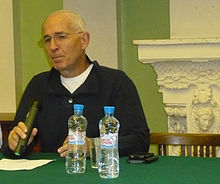
Hannes Swoboda is an Austrian social democratic politician who served as a Member of the European Parliament from 1996 until 2014. Within the Parliament, he represents the Social Democratic Party of Austria and from January 2012 to June 2014, he was also the President of the group of the Progressive Alliance of Socialists and Democrats.

Othmar Karas is an Austrian politician who has been serving as the First Vice-President of the European Parliament since January 2022, having been a Member of the European Parliament (MEP) since 1999. He is a member of the Austrian People's Party (ÖVP), which in turn affiliates with the European People's Party.

Ursula Stenzel is an Austrian politician who was a Member of the European Parliament (MEP) from 1996 to 2006. Until September 2015, she was a member of the Austrian People's Party. She is also a former member of the bureau of the European People's Party, and sat on the European Parliament's Committee on Foreign Affairs.
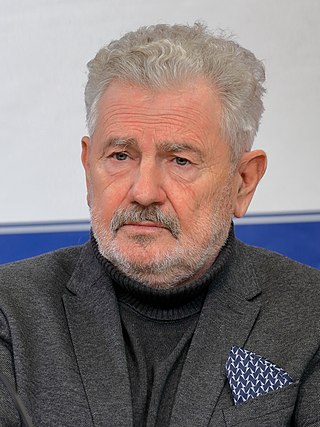
Andreas Mölzer is an Austrian politician and former Member of the European Parliament for the Freedom Party of Austria.
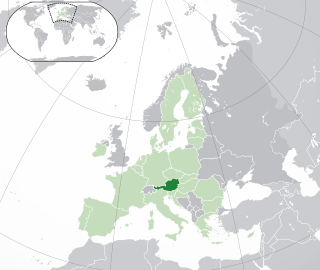
The history of the Jews in Austria probably begins with the exodus of Jews from Judea under Roman occupation. There have been Jews in Austria since the 3rd century CE. Over the course of many centuries, the political status of the community rose and fell many times: during certain periods, the Jewish community prospered and enjoyed political equality, and during other periods it suffered pogroms, deportations to concentration camps and mass murder, and antisemitism. The Holocaust drastically reduced the Jewish community in Austria and only 8,140 Jews remained in Austria according to the 2001 census. Today, Austria has a Jewish population of 10,300 which extends to 33,000 if Law of Return is accounted for, meaning having at least one Jewish grandparent.

Heinz-Christian Strache is an Austrian politician and dental technician who served as Vice-Chancellor of Austria from 2017 to 2019 before resigning owing to his involvement in the Ibiza affair. He was also Minister of Civil Service and Sports from January 2018 to May 2019 and chairman of the Freedom Party (FPÖ) from April 2005 to May 2019. He previously served as a member of the National Council from October 2006 until December 2017 and as a member of the municipal council and state legislature of Vienna (2001–2006).
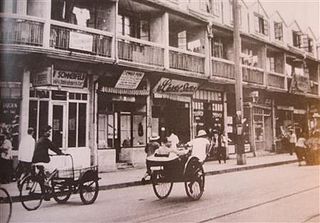
The Shanghai Ghetto, formally known as the Restricted Sector for Stateless Refugees, was an area of approximately one square mile (2.6 km2) in the Hongkou district of Japanese-occupied Shanghai. The area included the community around the Ohel Moshe Synagogue. Shanghai was notable for a long period as the only place in the world that unconditionally offered refuge for Jews escaping from the Nazis. After the Japanese occupied all of Shanghai in 1941, the Japanese army forced about 23,000 of the city's Jewish refugees to be restricted or relocated to the Shanghai Ghetto from 1941 to 1945 by the Proclamation Concerning Restriction of Residence and Business of Stateless Refugees. It was one of the poorest and most crowded areas of the city. Local Jewish families and American Jewish charities aided them with shelter, food, and clothing. The Japanese authorities increasingly stepped up restrictions, surrounded the ghetto with barbed wire, and the local Chinese residents, whose living conditions were often as bad, did not leave. By 21 August 1941, the Japanese government closed Shanghai to Jewish immigration.
The Kreisky–Peter–Wiesenthal affair was a political and personal feud in the 1970s, fought between the then Austrian chancellor Bruno Kreisky and the Nazi hunter Simon Wiesenthal, arising from Kreisky's ministerial appointments and the SS past of Freedom Party leader Friedrich Peter, which had been revealed by Wiesenthal.

Ulrike Lunacek is an Austrian politician who served as State Secretary for Cultural Affairs in the government of Chancellor Sebastian Kurz in 2020. She is a member of the Austrian Green party The Greens – The Green Alternative, part of the European Green Party.

Jörg Haider was an Austrian politician. He was Governor of Carinthia on two occasions, the long-time leader of the Freedom Party of Austria (FPÖ) and later Chairman of the Alliance for the Future of Austria, a breakaway party from the FPÖ.

The Freedom Party of Austria is a national-conservative and right-wing populist political party in Austria. It has been led by Herbert Kickl since 2021. It is the third largest of five parties in the National Council, with 30 of the 183 seats, and won 16.2% of votes cast in the 2019 legislative election and it is represented in all nine state legislatures. On a European level, the FPÖ is a founding member of the Identity and Democracy Party and its three MEPs sit with the Identity and Democracy (ID) group.
Wolfgang Ilgenfritz was an Austrian politician and most notably a non-attached Member of the European Parliament. He served for one parliamentary term and was a member of the Freedom Party of Austria.

Hans Kronberger was an Austrian politician who was Member of the European Parliament. He was a parliamentary member of the Freedom Party of Austria, although was officially considered non-attached. After his unsuccessful candidacy in the 2004 European Parliament election, Kronberger contested his fellow Freedom Party of Austria member, Andreas Mölzer's election in the Constitutional Court of Austria.

The Social Democratic Party of Austria is a social-democratic political party in Austria. Founded in 1889 as the Social Democratic Workers' Party of Austria and later known as the Socialist Party of Austria from 1945 until 1991, the party is the oldest extant political party in Austria. Along with the Austrian People's Party (ÖVP), it is one of the country's two traditional major parties. It is positioned on the centre-left on the political spectrum.
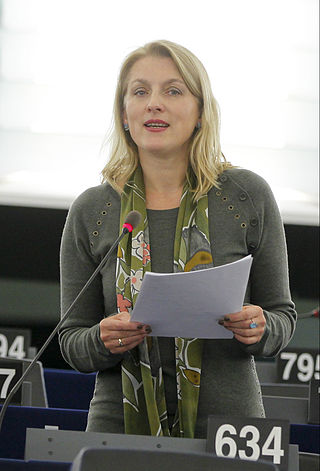
Evelyn Regner is an Austrian lawyer and politician who has been serving as a Member of the European Parliament from Austria since 2009. She is a member of the Social Democratic Party of Austria, part of the Progressive Alliance of Socialists and Democrats and elected Vice-President of the European Parliament.

Márton Gyöngyösi is a Hungarian politician, who has been the leader of the political party Jobbik since 2022. He was a Member of Parliament from 2010 to 2019. He was the leader of the Jobbik's parliamentary group from 2018 to 2019. He was elected a Member of the European Parliament (MEP) in the 2019 European Parliament election, as a result he resigned from his seat in the national parliament.
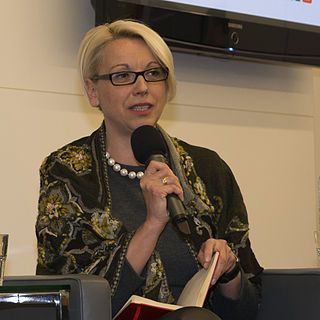
Angelika Rosa Mlinar is an Austrian and Slovenian politician who served as Member of the European Parliament (MEP) from 2014 until 2019. She is a member of NEOS – The New Austria, part of the Alliance of Liberals and Democrats for Europe. She belongs to the minority of Carinthian Slovenes. She is a distinguished fellow of the European Institute for International Law and International Relations.

Eugen Tomac is a Romanian politician, historian and journalist currently serving as MEP in the European Parliament for Romania since 2019. He is also the President of the People's Movement Party (PMP).

Andreas Schieder is an Austrian politician who has been a Member of the European Parliament since 2019.

Christian Sagartz is an Austrian politician of the Austrian People's Party (ÖPP) who has been serving as Member of the European Parliament since 2020.
